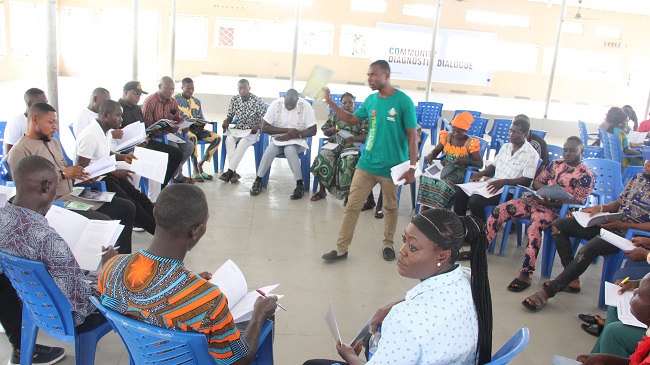Representatives of some communities in the Niger Delta region of Nigeria were recently offered a platform to review the environmental situations of their neighbourhoods and identify areas where actions to preserve and defend their heritage are needed.

Oil and gas exploitation has exposed communities in Nigeria to decades of unabated pollution, giving rise to health challenges, livelihood stress and a general denial of a good quality lifestyle and wellbeing of the community people.
Gas flaring has been a major source of environmental damage and habitat loss in the Niger Delta region and has adversely affected local people that depend on fishing and farming as major sources of their livelihood.
Over the years, the Health of Mother Health Foundation (HOMEF) has facilitated dialogues in communities affected by oil and gas exploitation activities and has rallied support for the communities to speak up against the polluting activities of corporations and seek justice.
At a two-day gathering of two separate sessions facilitated by HOMEF in in Bayelsa State, over 80 participants from Ekpetiama (Bayelsa State) and Iwherekan (Delta State) had community dialogue and trainings for environmental monitoring and advocacy.
A participant from Ekpetiama, Peredangikumo Ogiriki, lamented the state of things in his community. According to him, before oil and gas operations began there, they had enjoyed peace and unity.
He added: “Today, there is disunity and suspicion and activities such as indiscriminate sand mining and massive gas flaring have led to pollution of our river and the air.”
Another participant, Kaka Taripreye, stated: “Our challenges are numerous from degradation of our community to our physical and social needs. As a fisherman, the river pollution has affected me, and it is difficult for me to make ends meet. You return home with nothing after a whole day of toiling. Gas flaring in the community has affected everything. Our farm yields are now poor, and this is affecting us badly.”
“We have suffered very much from the gas flare. I am an undergraduate, sadly all we do is struggle to live here due to environmental degradation. Our health is affected, and we have no health facility, it is a terrible living condition,” lamented one Jane Ogiriki.
During the training, resource persons charged community members to be vigilant, and to note and report on happenings in their environment. Iwherekan and Ekpetiama communities have similar challenges especially those related to gas flaring. There are rampant incidents of respiratory diseases and increase of cardiac cases.
It will be recalled that, in 2005, Iwherekan community sued Shell Petroleum Development Company and the Attorney General of the Federation for engaging in gas flaring in the community which they saw as unconstitutional and an affront to their right to life.
The Federal High Court in Benin City ruled in agreement with the community and held that gas flaring is unconstitutional and against the human rights of the people. The court ordered the oil company to present its plans for terminating the illegal act in Iwwherekan. Fifteen years after the ruling, the gas furnaces at Iwherekan continue to roar and spew a cocktail of toxic elements into the atmosphere.
The workshop also offered community people opportunity for simulative role playing whereby community people played roles of government, corporations, CSOs and communities. This was engaging, participatory and exciting as participants freely expressed their thoughts on the environmental misbehavior of those who ought to protect the environment.
At the end of the meetings, participants demanded that government must ensure that all oil spills, gas flare, and wastewater pollution in and around the communities come to a halt.
